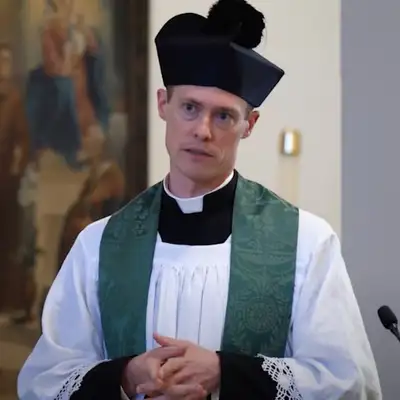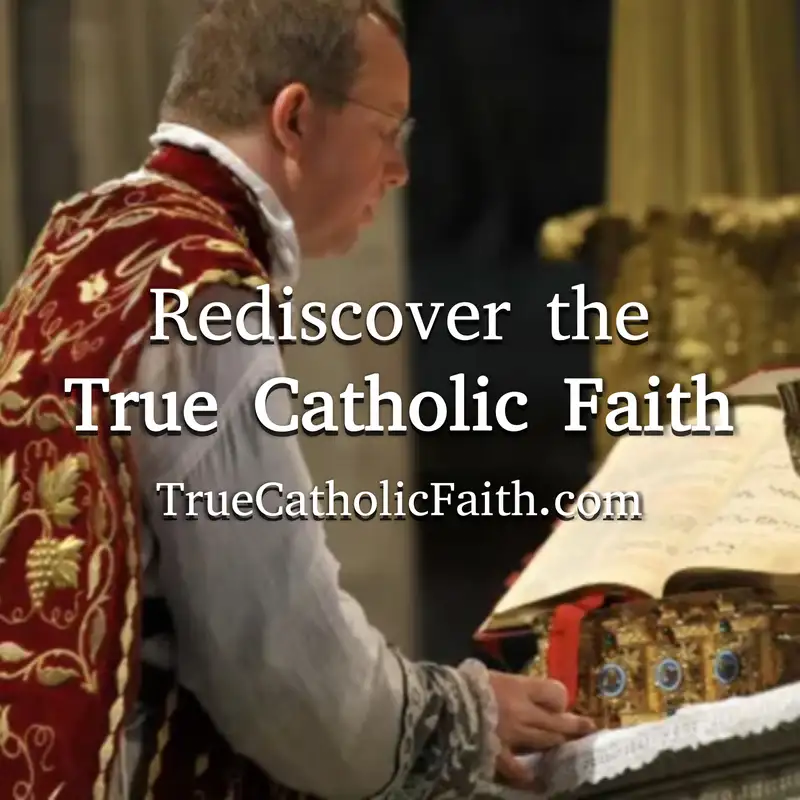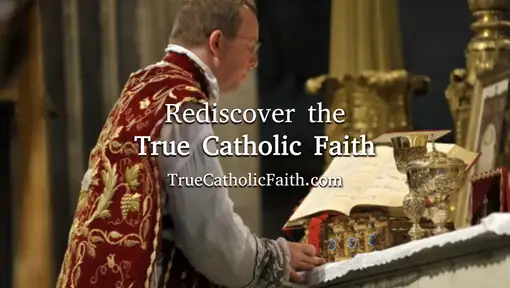Sedevacantism, a Moral Imperative - Fr. Michael DeSaye 09-30-24
Download MP3In the name of the father, and of the son, and of the holy ghost. Amen.
Fr. Michael DeSaye:The recent statement that all religions are paths to God, which was made by Bergoglio a few weeks ago, is making many people start to question how he could really be the pope. It has generated a renewal of interest the sedevacantism, which which has arguments being proposed both for and against it. Now many years ago, it was common to hear people dismiss sedevcantists as lunatics whose position was so outrageous that it was not even worth addressing.
Fr. Michael DeSaye:But now, one sees serious articles and even well researched books which have been written on the subject. This is good in the sense that it indicates that it is finally being taken seriously as having merit and being worthy of consideration. There are various arguments out there defending the sedevacantist position. The more popular argument in favor of it is the heretical pope argument. It's a very simple argument and it goes like this.
Fr. Michael DeSaye:Bergoglio is a heretic. Heretics cannot be members of the church. Therefore, he is not a member of the church, so how could he be the pope? This has a certain elegant simplicity and, it's approachable. It seems plausible.
Fr. Michael DeSaye:However, this argument does not justify the sedevacantist position. The reason is that the church does not have any official teaching on what to do if the pope becomes a heretic. So in taking up the heretical pope position, we are not relying on something solid, something infallible to support ourselves like a dogma of the faith. There is no dogma on what to do with a heretical pope. There is no canon law on what to do with a heretical pope.
Fr. Michael DeSaye:There is nothing in sacred scripture. Even the fathers of the church offer nothing on the subject. Therefore, those who take up this position in defense of sedevacantism must rely on the speculations of medieval theologians and some modern theologians. In examining the works of these men, we find that although they make many speculations on what to do if there is a heretical pope, not one single one of them says that if the faithful find themselves in a situation of a heretical pope, they are to set up an alternative apostolate as if the entire church were cettevocante. None of them say that if the pope becomes a heretic, the faithful ought to proceed as if the saint as if the see of Saint Peter is vacant.
Fr. Michael DeSaye:Therefore, those who rely on this argument find themselves lacking support for their position. There's nothing from sacred scripture, the father's tradition, the catechism, the magisterium, or theologians. Now this is not to deny that Bergoglio really is a heretic. Heretic. Of course, is.
Fr. Michael DeSaye:In fact, he is even worse than that. He is a liberal and an apostate. But we are only saying that the observation of this reality is not something that can justify the sedevicantist apostolate, our mission, what we're doing here. At best, we could cite the general moral principle that we must avoid people or situations which would cause us to compromise our faith or morals. This principle is good and important.
Fr. Michael DeSaye:We must do whatever it takes to preserve our Catholic faith and moral life. And if the Pope is one of those people who threatens our preservation of the faith or moral life, then we must avoid him on this principle. But this is not the same thing as saying that the pope is not the pope. Nor could these be considered lawful grounds for setting up an entirely distinct apostolate completely separated from him and his bishops. To illustrate this point, let's say that we were called to trial in the church for the crime of schism.
Fr. Michael DeSaye:And we tried to use this argument in support of sedevacantism, the heretical pope argument. The lawyers on the opposing side would have an easy time dismantling our case. Indeed, we would find it impossible to support our position because there are no theologians who support it. Whereas the opposing team would be able to support their position with an abundance of material from traditional sources, and armed with this material, they would easily convince the judge to find us guilty of schism. But there is another argument in favor of sedevacantism, which cannot be refuted.
Fr. Michael DeSaye:This argument goes like this. If anyone should promulgate or publish errors against faith or morals to the Catholic church universally, then it is impossible that that man be the Roman pontiff. For the Roman pontiff is always guarded by the Holy Ghost from doing this. Bergoglio promulgates errors against faith and morals to the universal church. Therefore, it is impossible that he be the Roman pontiff.
Fr. Michael DeSaye:He does not have that assistance of the Holy Ghost, which is guaranteed to the Roman pontiff. Vatican Council eighteen seventy teaches that in the See Of Saint Peter, that is from the chair of the Roman pontiff, the Catholic faith will always be preserved. This means that for all of the shortcomings that a pope may have in his personal life, he will never in his official capacity as teacher of the universal church, which is called ex cathedra, you will never teach anything that is against the Catholic faith or moral life. A lot of people get bogged down by this expression ex cathedra. That seems to confuse people.
Fr. Michael DeSaye:What is that? It's very simple. Think of a regular school. When a teacher is in class in front of the students teaching, it is obvious that he is exercising his office as teacher. When the teacher is doing his grocery shopping or playing sports, he is not exercising his office of teacher.
Fr. Michael DeSaye:In the same way, if a pope makes a written statement to all the faithful throughout the world about something pertaining to faith or morals, then clearly he is exercising his office as supreme teacher in the church. But if he is at a social gathering, for example, talking to people over coffee and donuts, he is not exercising his office as teacher. The first is ex cathedra. The second is not. Now it is conceivable that while having coffee and doughnuts, he could say something heretical.
Fr. Michael DeSaye:We hope he does not. But he could say something heretical, also in an interview or even from the pulpit, he could say something. But it is not possible that he could publish these heresies to the universal church as if they were magisterial teachings. This is what it means that the faith will always be preserved in the sea of Saint Peter. Now what about this teaching that one can go to God in all religions?
Fr. Michael DeSaye:This was just something Bergoglio said at a conference, so of course this statement taken on its own is not a universal teaching. However, Bergoglio did not invent this error on the spot. It is something that forms part of the essential Novus Ordo religion. It is in Vatican 2. It has been promulgated as official teaching by Paul the sixth, JP two, Ratzinger, and Bergoglio, and it is taught in Novus Ordo schools as part of that religion.
Fr. Michael DeSaye:So what he said in that conference is really just a citation of something that officially forms part of the Vatican religion. So in these men, it appears that the faith has not been preserved in the Sea Of Saint Peter. According to the church, this is impossible. It will always be preserved. Therefore, it is necessary to conclude that these men never actually had possession of the Sea Of Saint Peter to begin with.
Fr. Michael DeSaye:If we accept these men as true popes, then we would have to say that Rome has lost the faith and we are prohibited from saying this. By the way, that so called prophecy which says that Rome will lose the faith and become the seat of Antichrist. Perhaps you have heard this. It was condemned by Pope Pius XI in 1923. One still hears this mentioned in traditional Catholic circles, but it is condemned.
Fr. Michael DeSaye:Likewise, the other so called prophecy that says that there will be a pope under the control of Satan. I don't remember the source of this, but one sometimes hears this spoken about in traditional circles. This has also never been approved by the church. If one submits to Vatican two, one would have to conclude that the Catholic church has come to an end. It would no longer be the pillar and ground of truth as Saint Paul called it, but would be like any other religious organization, teaching many contradictory things against faith and morals, a mixture of error and truth.
Fr. Michael DeSaye:It would have to be called a temple of lies, designed to seduce and deceive rather than to enlighten and save. The Catholic church can never become a temple of lies. It can never become an organization that seduces souls and leads them to hell. It is indefectible. It will always persevere in its mission to save souls without fail to the end of the age.
Fr. Michael DeSaye:Our opponents have offered only one critique of this position. They say that this position expects too much from the pope. They say that it is possible for there to be many errors against faith and morals in universal papal teachings. It is only a few extremely rare cases when a pope is infallible, they say, like the dogmas of the Immaculate Conception and the Assumption. But everything else he teaches, they say, or almost everything else, is subject to error, even ecumenical councils and encyclicals.
Fr. Michael DeSaye:And all of this can be dismissed by the faithful at will if they find it to be wrong. But this position is wrong completely. Pope Pius the twelfth said that what is expounded in encyclicals demands a cent. And if it demands a cent, then it cannot contain error. For then the pope would be demanding that all Catholics abandon the faith, which is absurd.
Fr. Michael DeSaye:Saint Thomas said that if the Magisterium were subject to error, then the church would be subject to failure in its mission to save souls. And since it will never fail in this mission by the will of Christ, its teachings can never contain error. Plus it goes against reason. What is the point of having a permanent supreme teacher in the church if he is almost always subject to being wrong when he teaches? Who would enroll their children in a school if the professors were usually subject to being wrong when they taught and could only be trusted to be right on very rare occasions?
Fr. Michael DeSaye:Who would join a church in which the people considered their supreme teacher to be subject to error most of the time. This is madness. If you had access to the Vatican Library and you managed to collect all the things that the popes had ever taught on faith and morals to the universal church, starting with Saint Peter and going all the way to Pope Pius XII , you would not be able to find one single contradiction, one single deviation from the teachings of our blessed Lord and the apostles. In fact, you would very much get the impression that you were reading the works of one individual author, even though the works were written by many different men and published many centuries apart. For centuries now, anti Catholic historians have endeavored to show that this or that Pope taught error for the purpose of undermining the infallibility of the Roman pontiff.
Fr. Michael DeSaye:But none have succeeded. In fact, they have been unable to show that any Pope has said anything even slightly misleading to the universal church that drew the faithful into error by accident. In fact, many of these historians have ended up converting to Catholicism as a result of their astonishment at, one might say, the miraculous continuity of the church's teaching from the chair of Saint Peter. This continuity is not a coincidence. It is necessary that the Catholic Church be this way by God's will.
Fr. Michael DeSaye:Just as it is impossible for a horse to fly, it is impossible that error against faith or morals be found in the Church's teachings. Christ will that the teachings of the church be received as his own. If the teachings of the church could in any way be false, then God himself would be the author of error in man. The church is not like other religious organizations that are governed by mere men and by their own reason. God is the authority of the church.
Fr. Michael DeSaye:It is He who presides at her ecumenical councils and guides them. He so sustains the Church that she is, as it were, another Christ. Clearly, Our Lord Himself views the Church in this manner. Because when Saint Paul was persecuting the church before his conversion, our Lord said to him, Saul, Saul, why persecutest thou me? So if the church teaches that one can go to God by other religions, then the church cannot be another Christ.
Fr. Michael DeSaye:For Christ never taught this abominable doctrine. This argument, justifying sedevacantism, is irrefutable because it is drawn straight from the church's teachings. We can answer the question why are you a sedevacantist? By saying that there is no other way to preserve the church's infallibility or indefectibility except by this position. To not be a sedevacantist is to admit that Christ gave us a false and defective church that has totally failed in its mission to save souls.
Fr. Michael DeSaye:No Catholic may do this. Thus, sedevacantism is not only justified morally as an acceptable position to hold, it is necessary as a certain conclusion, drawn from dogmatic premises which all Catholics must admit. Believe me, if I felt I had a choice whether I wanted to be a sedevacantist or not, I would not have chosen it. I wish we did not have to be I wish we had a true Pope and things were normal in the church. It would make many things much easier for us.
Fr. Michael DeSaye:But our faith demands this of us. There is no other way to reconcile one's faith with the church's teachings except by this position. My hope is that this clears up some of the confusion about sedevacantism, so that it becomes better understood by Catholics as really a moral imperative. It is not a knee jerk reaction to a bad situation trumpeted by right wing extremists. It is a sure and certain conclusion grounded in the Catholic faith.
Fr. Michael DeSaye:In the name of the Father, and of the Son, and of the Holy Ghost. Amen.
Creators and Guests


